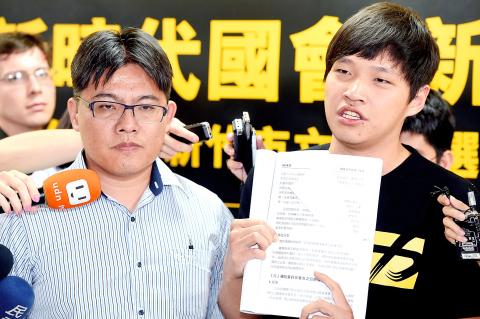Differences in values forestall any immediate “integration” with Democratic Progressive Party (DPP) caucus whip Ker Chien-ming (柯建銘) in the race for Hsinchu City’s legislative seat, New Power Party (NPP) candidate Chiu Hsien-chih (邱顯智) said yesterday.
“We have to pursue our values, and those values are not ‘swappable,’” Chiu said.
“Currently, there are value differences [with Ker], which we take seriously, making integration extremely difficult,” Chiu said.

Photo: Chu Pei-hsiung, Taipei Times
He called for Ker to agree to a public debate, holding out the possibility of “integration” if there was an “adequate foundation” after gauging public opinion.
Chiu’s statement comes as he faces increasing pressure to withdraw from the race amid reports that Ker’s campaign is struggling, with DPP Chairperson Tsai Ing-wen (蔡英文) saying on Wednesday at a meeting of the party’s Central Governing Committee that more should be done to help his campaign.
Ker, who represented the district for several terms before being elected as an at-large legislator, has returned to campaign for his former seat because of DPP rules, which forbid members from serving as at-large legislators for more than two terms.
Chiu said that his main difference with Ker centered around the necessity of promoting a “transparent and professional” Legislative Yuan, as he criticized Ker’s use of “cross-caucus negotiations” to facilitate passage of controversial bills during his tenure as DPP caucus whip.
“This system [of negotiations] is riddled with problems, including closed talks, hollowing out [legislative] committees and concreting power in the hands only a few people,” Chiu added.
“After bills are sent into cross-caucus negotiations, they can be completely altered, so if you’re a [regular legislative] committee member, you won’t take the review of bills seriously because it’s meaningless,” he said.
NPP Chairman Huang Kuo-chang (黃國昌) said the party would “support Chiu until the end,” adding that whether the party and DPP would coordinate on electoral districts would be determined on a case-by-case basis.

Alain Robert, known as the "French Spider-Man," praised Alex Honnold as exceptionally well-prepared after the US climber completed a free solo ascent of Taipei 101 yesterday. Robert said Honnold's ascent of the 508m-tall skyscraper in just more than one-and-a-half hours without using safety ropes or equipment was a remarkable achievement. "This is my life," he said in an interview conducted in French, adding that he liked the feeling of being "on the edge of danger." The 63-year-old Frenchman climbed Taipei 101 using ropes in December 2004, taking about four hours to reach the top. On a one-to-10 scale of difficulty, Robert said Taipei 101

Nipah virus infection is to be officially listed as a category 5 notifiable infectious disease in Taiwan in March, while clinical treatment guidelines are being formulated, the Centers for Disease Control (CDC) said yesterday. With Nipah infections being reported in other countries and considering its relatively high fatality rate, the centers on Jan. 16 announced that it would be listed as a notifiable infectious disease to bolster the nation’s systematic early warning system and increase public awareness, the CDC said. Bangladesh reported four fatal cases last year in separate districts, with three linked to raw date palm sap consumption, CDC Epidemic Intelligence

US climber Alex Honnold left Taiwan this morning a day after completing a free-solo ascent of Taipei 101, a feat that drew cheers from onlookers and gained widespread international attention. Honnold yesterday scaled the 101-story skyscraper without a rope or safety harness. The climb — the highest urban free-solo ascent ever attempted — took just more than 90 minutes and was streamed live on Netflix. It was covered by major international news outlets including CNN, the New York Times, the Guardian and the Wall Street Journal. As Honnold prepared to leave Taiwan today, he attracted a crowd when he and his wife, Sanni,

Taiwanese and US defense groups are collaborating to introduce deployable, semi-autonomous manufacturing systems for drones and components in a boost to the nation’s supply chain resilience. Taiwan’s G-Tech Optroelectronics Corp subsidiary GTOC and the US’ Aerkomm Inc on Friday announced an agreement with fellow US-based Firestorm Lab to adopt the latter’s xCell, a technology featuring 3D printers fitted in 6.1m container units. The systems enable aerial platforms and parts to be produced in high volumes from dispersed nodes capable of rapid redeployment, to minimize the risk of enemy strikes and to meet field requirements, they said. Firestorm chief technology officer Ian Muceus said